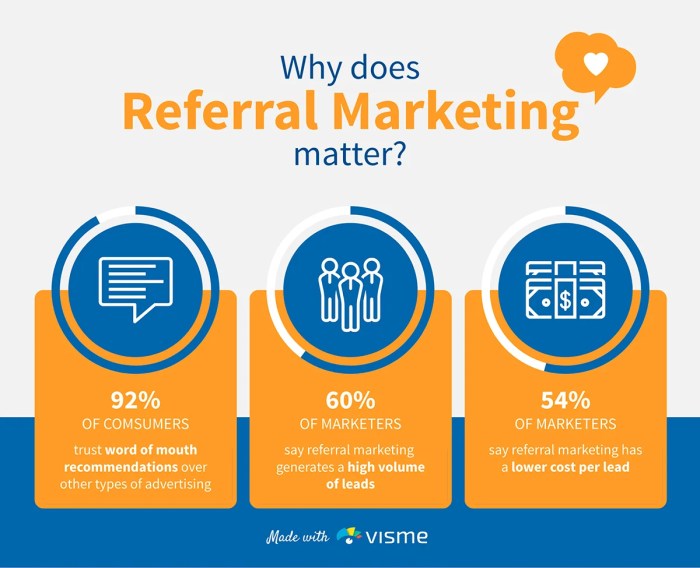Referral Marketing Ideas takes center stage, inviting readers into a world of innovative strategies and engaging tactics. From creative ideas to successful campaigns, this topic covers it all with a fresh and dynamic approach.
Get ready to dive into the realm of referral marketing and explore the endless possibilities that can elevate your business to new heights.
Referral Marketing Strategies: Referral Marketing Ideas

Referral marketing is a powerful strategy that leverages word-of-mouth to drive customer acquisition and increase brand awareness. By encouraging existing customers to refer your products or services to their friends and family, you can tap into a trusted network of potential new customers. Here are some creative referral marketing ideas to help you boost your business:
Host a Referral Contest
Organize a referral contest where customers can earn rewards for referring a certain number of friends. This can create excitement and motivation for customers to spread the word about your business.
Create a Referral Program with Incentives
Offer incentives such as discounts, freebies, or exclusive access to premium features for both the referrer and the new customer. This motivates customers to participate in the referral program and increases the chances of successful referrals.
Utilize Social Media for Referral Marketing
Encourage customers to share their referral links on social media platforms to reach a wider audience. You can also create social media contests or challenges to engage customers and promote sharing.
Partner with Influencers for Referral Campaigns
Collaborate with influencers in your industry who can promote your referral program to their followers. Influencers can help amplify your message and reach a larger audience that trusts their recommendations.
Leverage User-Generated Content for Referral Marketing
Encourage customers to create and share content related to their experience with your brand. User-generated content can be a powerful tool for referral marketing as it showcases real testimonials and endorsements from satisfied customers.
Implementing a referral marketing strategy can bring various benefits to your business, including increased customer loyalty, higher conversion rates, and cost-effective customer acquisition. By tapping into the networks of your existing customers and incentivizing them to refer others, you can drive growth and expand your customer base organically.
Incentives for Referral Programs
When it comes to referral programs, offering incentives can be a powerful way to motivate your customers to refer others to your business. Incentives can come in various forms, from monetary rewards to non-monetary perks. Let’s explore the different types of incentives and how to choose the right ones for your target audience.
Types of Incentives
- Monetary Incentives: These include cash rewards, discounts, or credits that customers receive for every successful referral they make. Monetary incentives are straightforward and can appeal to a wide range of customers who are motivated by financial gains.
- Non-Monetary Incentives: These can be in the form of gift cards, free products or services, exclusive access to events, or recognition and status within a community. Non-monetary incentives focus on providing value beyond money and can create a sense of loyalty and belonging among referrers.
Effectiveness Comparison
- Monetary Incentives: While monetary rewards can attract a larger pool of referrers due to the universal appeal of money, they may not always result in genuine referrals. Some customers may refer others solely for the reward without true loyalty to your brand.
- Non-Monetary Incentives: Non-monetary perks, on the other hand, can foster stronger relationships with customers who genuinely believe in your products or services. These incentives focus on building trust and loyalty, leading to more sustainable referral relationships.
Choosing the Right Incentives
- Know Your Audience: Understand the preferences and motivations of your target audience. Some customers may value discounts and rewards, while others may appreciate exclusive experiences or recognition.
- Test and Iterate: Experiment with different types of incentives to see what resonates best with your customers. Collect feedback and data to refine your referral program over time.
- Align with Brand Values: Ensure that the incentives you offer align with your brand values and resonate with the overall customer experience you aim to deliver.
Referral Program Implementation

Implementing a successful referral program can be a game-changer for your business. Here are some key steps to set up and optimize your referral program for maximum results.
Setting Up a Referral Program
- Define your goals and objectives for the referral program.
- Select a referral marketing platform or software to manage your program effectively.
- Create compelling referral messages and materials for your existing customers to share.
- Determine the rewards or incentives for both the referrer and the referee.
- Promote your referral program through various channels like email, social media, and your website.
Tracking and Analyzing Referral Program Data
Tracking and analyzing data from your referral program is crucial to understanding its performance and making necessary adjustments. Here are some best practices:
- Monitor key metrics such as referral conversion rate, customer acquisition cost, and lifetime value of referred customers.
- Use tracking tools to attribute referrals accurately and measure the impact of your program.
- Analyze referral trends and patterns to identify what strategies are working and where improvements can be made.
Optimizing a Referral Program for Maximum Results
To optimize your referral program for maximum results, consider the following best practices:
- Continuously test and refine your referral messaging and incentives based on data and customer feedback.
- Personalize the referral experience for both the referrer and the referee to increase engagement and conversions.
- Incentivize repeat referrals by rewarding customers who refer multiple times or refer high-quality leads.
- Encourage referrals at key touchpoints in the customer journey to maximize opportunities for customer advocacy.
Referral Program Promotion
Promoting a referral program is key to its success, whether online or offline. Utilizing various strategies to reach a wider audience can significantly boost participation and engagement.
Online Promotion
- Utilize social media platforms to create buzz around the referral program. Share engaging content, testimonials, and success stories to encourage participation.
- Run targeted online ads to reach potential referrers and referees. Use compelling visuals and clear call-to-action to drive conversions.
- Collaborate with influencers in your industry to promote the referral program. Influencers can help amplify your message and reach a larger audience.
Offline Promotion
- Host events or workshops to promote the referral program. Offer incentives for attendees to refer others and spread the word about the program.
- Print flyers, posters, or business cards with referral program details to distribute at local businesses or community events.
- Partner with other businesses to cross-promote referral programs. This can help reach new audiences and increase participation.
Creative Promotional Tactics, Referral Marketing Ideas
- Run referral contests with exciting prizes for top referrers. This can create a sense of competition and motivate participants to refer more people.
- Create a referral leaderboard to showcase top referrers and encourage friendly competition among participants.
- Implement a “double-sided” referral program where both the referrer and referee receive rewards. This can incentivize both parties to participate and refer others.





